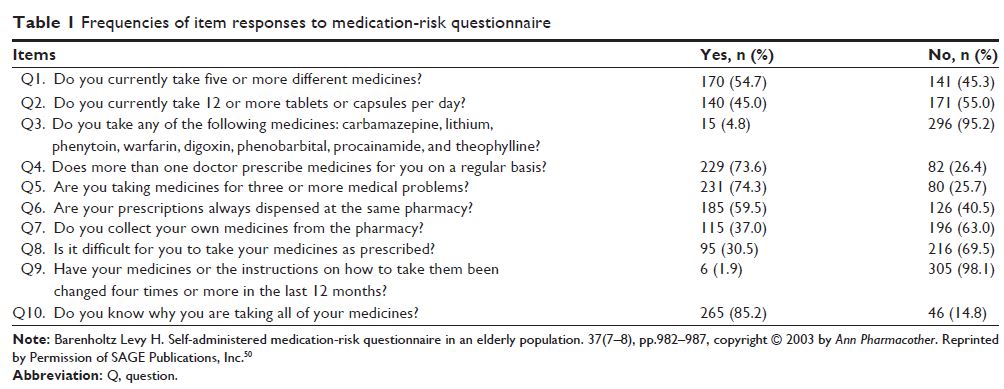108985
论文已发表
注册即可获取德孚的最新动态
IF 收录期刊
- 3.4 Breast Cancer (Dove Med Press)
- 3.2 Clin Epidemiol
- 2.6 Cancer Manag Res
- 2.9 Infect Drug Resist
- 3.7 Clin Interv Aging
- 5.1 Drug Des Dev Ther
- 3.1 Int J Chronic Obstr
- 6.6 Int J Nanomed
- 2.6 Int J Women's Health
- 2.9 Neuropsych Dis Treat
- 2.8 OncoTargets Ther
- 2.0 Patient Prefer Adher
- 2.2 Ther Clin Risk Manag
- 2.5 J Pain Res
- 3.0 Diabet Metab Synd Ob
- 3.2 Psychol Res Behav Ma
- 3.4 Nat Sci Sleep
- 1.8 Pharmgenomics Pers Med
- 2.0 Risk Manag Healthc Policy
- 4.1 J Inflamm Res
- 2.0 Int J Gen Med
- 3.4 J Hepatocell Carcinoma
- 3.0 J Asthma Allergy
- 2.2 Clin Cosmet Investig Dermatol
- 2.4 J Multidiscip Healthc

就中国社区老年人与健康相关的生活质量而言,与药物相关的危险因素
Authors Zhang S, Meng L, Qiu F, Yang JD, Sun S
Received 10 November 2017
Accepted for publication 19 January 2018
Published 10 April 2018 Volume 2018:12 Pages 529—537
DOI https://doi.org/10.2147/PPA.S156713
Checked for plagiarism Yes
Review by Single-blind
Peer reviewers approved by Dr Justinn Cochran
Peer reviewer comments 2
Editor who approved publication: Dr Naifeng Liu
Background: Previous studies have demonstrated that medication adherence has
an impact on health-related quality of life (HRQoL). However, other
medication-related factors that may influence HRQoL have not been extensively
studied, especially factors based on the Medication-Risk Questionnaire (MRQ),
and such studies are mostly done in Western countries. Our objective was to
explore risk factors associated with HRQoL among community-dwelling elderly
with chronic diseases in mainland China, especially the medication-related risk
factors regarding MRQ.
Methods: The study was conducted in a community health service center through
surveys to eligible patients. The main outcomes of HRQoL were assessed by the
EuroQol-5D (EQ-5D) scale and EQ-visual analog scale (EQ-VAS).
Medication-related risk factors according to MRQ associated with HRQoL were
identified using a multiple linear regression.
Results: A total of 311 patients were analyzed, averaging
71.19±5.33 years, and 68.8% were female. The mean EQ-5D index was
0.72±0.09, and the mean EQ-VAS score was 71.37±11.97. The most prevalent
problem was pain/discomfort, and 90.0% believed that they could take care of
themselves without any problems. Sex, age, educational level, frailty, function
status, and certain medication-related factors regarding MRQ were found to be significant
factors impacting the HRQoL. A multivariate analysis showed that MRQ factors of
polypharmacy, multimorbidity, feeling difficultly with taking medicines as
prescribed, and taking medicines with narrow therapeutic index had negative
impacts on the quality of life.
Conclusion: Patient’s internal characteristics and medication-related risk
factors according to MRQ were associated with quality of life. The results of
the MRQ is an indicator of quality of life that can identify patients who need
interventions.
Keywords: quality of life, medication risk factors, elderly, community-dwelling,
EQ-5D
